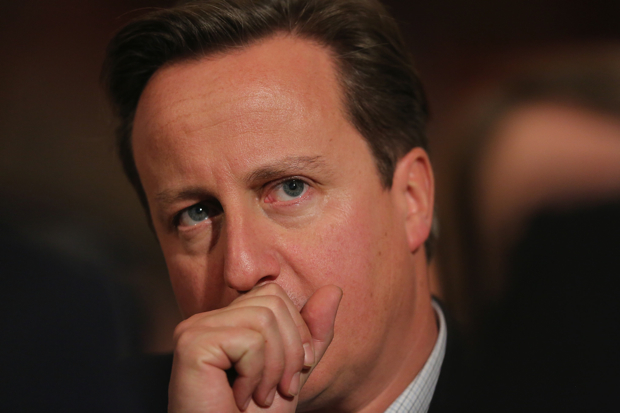Listen
No one goes to Birmingham to revive a marriage. But that is what David Cameron and the Conservative party must do next week at conference. They must find a way to put the passion back into their relationship, to learn to trust each other again ahead of the general election. For neither can win without the other next May.
That election is there to be won. The Labour gathering in Manchester this week was not one of a party convinced that it is going to surge to victory in a few months. The atmosphere was subdued, bordering on depressed. Thoughtful Labour frontbenchers wandered around fretting about how there was nothing in the programme to expand the party’s appeal. Unlike last year, Ed Miliband failed to make the political weather with his speech. By forgetting to talk about the deficit and immigration, he omitted the two most important issues in British politics — the ones that matter most to the voters.
Three issues most determine general elections: the economy, leadership and how unified a party is. On the first two, the Conservatives are polling well. But on the third, they have a major problem; 61 per cent of voters think they are divided. On stage in Birmingham next week, Douglas Carswell will not be mentioned. But in the bars and on the fringe, his defection — and its implications — will be much discussed. The split on the right is about to become a feature of the British parliamentary system, and could deny Cameron victory in 2015.
When Carswell resigned and forced a by-election in Clacton, the Conservative leadership feared it would overshadow everything else. They decided to hold it as soon as possible to get it out of the way. Events in Scotland, though, have meant that the by-election has not dominated the political agenda in the way that Ukip hoped it would. But the danger posed to the Conservatives’ electoral prospects by the split on the right remains just as acute.
No one at Conservative Campaign Headquarters now bothers to deny that Ukip will take Clacton. This defeat will be a brutal reminder that Cameron can’t win if Conservatives keep switching to Ukip. He has to find a way to stop the defections and to persuade some of those who have already gone to come back.
Some Conservatives pine for a new leader who can reunite the Conservative family. Many wistful glances are cast in Boris Johnson’s direction. They believe that the sheer force of Boris’s personality can solve this problem. For now, however, Cameron remains one of the Conservatives’ greatest electoral assets. He has 22 points on Ed Miliband on the question of who would be the best prime minister. Any Conservative strategy for victory has to take advantage of Cameron’s position in the leadership stakes.
Cameron once stood on a Conservative party policy of ‘change to win’. But it didn’t change enough and he didn’t win enough. This has put a strain on the union of the Cameroons and the old guard. Each blamed the other for the party’s failure to gain a majority in 2010. This problem has been compounded by the compromises of coalition and the loss of prime ministerial patronage involved. Cameron’s poor man management hasn’t helped either. He is, as even an ally of his admits, in danger of ‘suffering death by a thousand slights’.
But an unlikely marriage counsellor has emerged: Michael Gove. The new chief whip has set about trying to rebuild the relationship between the PM and his party. Cameron’s decision to whisk a group of parliamentarians off to Chequers on Monday had Gove’s fingerprints all over it. The guest list wasn’t confined to loyalists; it included several people that No. 10 had previously regarded as being beyond the pale.
Gove is assisted by Cameron’s parliamentary private secretary Gavin Williamson, who spends even more time talking to disaffected Tory MPs than Ukip. Regular visitors to No. 10 credit this pair with making the Cameron circle understand that it is not just the awkward squad who are frustrated with him. Lynton Crosby at Conservative Campaign Headquarters also spends a lot of his time holding the hands of agitated Conservative MPs.
In both policy and personnel terms, Cameron is closer to the Conservative party’s centre of gravity than he was in 2010. The rise of the new intake, who tend to be hard modernisers, and the fading away of old wets such as Ken Clarke, George Young and Andrew Lansley, has shifted the balance of the Cabinet to the right.
Policy-wise, Cameron is firmly in the Conservative mainstream. He wants to renegotiate Britain’s terms of EU membership with the result ratified by a referendum, limit the jurisdiction of the European Court of Human Rights, introduce English votes for English laws and continue with education and welfare reform. Some doubt Cameron’s sincerity on the first three issues, pointing out that he adopted these positions under pressure.
Then there are those Conservatives who would like to lose next year. What will puzzle political historians about this is how Miliband and his radical left-wing agenda did not unify the centre-right. Many on the right chuckle at how odd the voters think Miliband looks and assume that a Red Ed government would be the fastest route back to Conservative majority politics. They should remember that pre-’79, many on the left believed Mrs Thatcher’s manner was so grating that she couldn’t survive long at the top of British politics.
Miliband has long wanted to be the left’s Thatcher, to create a new political settlement. He felt able to offer such a genuine tribute to her on her death precisely because he wanted to overturn her legacy. If he wins next May, he’ll have the chance to do that. He already has an electoral advantage that Thatcher only gained in office: his side of the political spectrum is united while his opponents are divided.
Miliband is in the vanguard of a new political movement — left populism. This movement believes that the current economic rules are rigged in favour of the privileged few and favours considerably higher taxes and more government intervention to level the playing field. The more Miliband sets out this agenda, the more Cameron and the Conservative party should realise that if they cannot reconcile their differences, Britain will become a far more left-wing country.
Got something to add? Join the discussion and comment below.
Get 10 issues for just $10
Subscribe to The Spectator Australia today for the next 10 magazine issues, plus full online access, for just $10.
You might disagree with half of it, but you’ll enjoy reading all of it. Try your first month for free, then just $2 a week for the remainder of your first year.















Comments
Don't miss out
Join the conversation with other Spectator Australia readers. Subscribe to leave a comment.
SUBSCRIBEAlready a subscriber? Log in